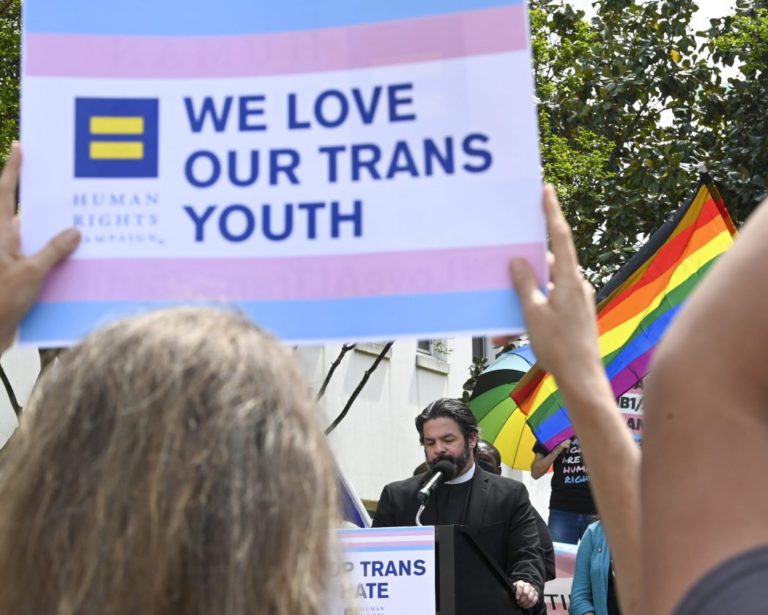

contributed photo
A rally at the Alabama Statehouse on March 30 to draw attention to and protest anti-transgender legislation introduced in Alabama.
On April 6, despite Republican Gov. Asa Hutchinson’s veto, Arkansas became the first state to prohibit physicians from providing gender-affirming medical care like hormone treatments designed to delay puberty in transgender youth. So-called “puberty blockers” are used to delay the physical changes associated with puberty and provide time for transgender young people to consider their options.
Arkansas physicians now face criminal penalties if they prescribe puberty blockers or other forms of cross-gender health care to transgender youth. Twenty other states are considering similar bills. Some would classify puberty blockers and other gender-affirming medical treatments as child abuse or would revoke the medical licenses of physicians prescribing these therapies.
These anti-transgender health care bills are part of a record number of anti-transgender policy reforms that conservative legislators have introduced this year in state legislatures across the country.
These include bills that will bar transgender athletes from participating in student sports and mandate parental notification for a school curriculum that is inclusive of LGBTQIA — lesbian, gay, bisexual, transgender, questioning and/or queer, intersex and asexual — issues. One additional variety, just signed into law by Republican Montana Gov. Greg Gianforte, requires gender reassignment surgery before any individual can change the sex marker on their birth certificate.
So far, anti-transgender athlete bills have gained the most traction. Despite consistent public opposition, 30 states have now considered barring transgender athletes from playing on teams that match their gender identity. Alabama, Arkansas, Mississippi, South Dakota and Tennessee have already passed legislation, and other states are likely to follow.
As a civil rights scholar, I have found that campaigns that mischaracterize LGBTQIA-supportive policies as harmful to young people are a staple strategy conservatives use to galvanize their base.
Anti-gay activist and Florida orange juice queen Anita Bryant first perfected the strategy in the 1970s to oppose ordinances prohibiting sexuality-based discrimination. Bryant’s “Save our Children” campaign demonized gays and lesbians as “recruiting children.” Bryant successfully encouraged voters to oppose legislative attempts to protect gays and lesbians from discrimination and prompted Florida legislators to bar same-sex couples from adopting children, a law that was later overturned in 2010.
In the late 1990s and early 2000s, conservatives prompted over 40 states to bar same-sex marriage on the basis that all children could be at risk — those raised by same-sex couples and those introduced to marriage equality at school.
In 2015, when the Supreme Court overturned these bans in the landmark case Obergefell v. Hodges, conservatives began targeting transgender rights.
Conservatives again trained their focus on nondiscrimination measures — this time those prohibiting gender identity discrimination. They misleadingly argued that any measure protecting transgender individuals would place cisgender girls and women (individuals whose gender identity and birth-assigned sex are both female) at risk by allowing men dressed as women to use women’s locker rooms and restrooms.
There is no evidence supporting this claim. Yet there is significant evidence of health and safety risks to transgender students if they are prohibited from using bathrooms that reflect their gender identity.
Conservatives are also using anti-trans-athlete talking points to oppose the Equality Act, a bill now circulating in the Senate that would add prohibitions against sexual orientation and gender identity discrimination to existing federal civil rights bills. The House passed a similar measure last year, but it failed to pass the Senate.
Transgender advocates have some recourse to fight the bills. Corporate backlash is one option. Litigation is another. Advocates for transgender rights have secured legal victories in state and federal court challenges involving bathrooms and locker rooms. More recently a federal judge in Idaho blocked that state’s anti-transgender athletes bill passed in 2020.
And the Supreme Court’s recent ruling in Bostock v. Clayton County, which protects LGBTQ individuals from certain forms of discrimination, seems at first blush to support transgender student equality. But the Bostock case is new, its application to sports and health care untested and political fervor is mounting. With a solid conservative majority on the Supreme Court — and in federal courts across the country — legal battles are unreliable.
In the meantime, transgender young people across the country are contemplating a more uncertain and dangerous future. Some are working with their parents to find out-of-state sources for puberty blockers. Others are contemplating moves to less hostile states. All of this because conservatives have channeled trumped-up claims into harmful legislation that outlaws transgender youths to further divide American voters.
——
Alison Gash is an associate professor
of political science at the University of Oregon.